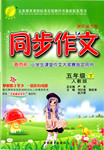题目内容
(题文)Your new backpack is so nice. I want to buy ________, too.
A. one B. it C. that D. this
A 【解析】 句意:你的新背包真漂亮。我也想买一个。A. one代词,代替前面提到的名词的单数,泛指;B. it人称代词,它,指前文提到的事物的本身;C. that指示代词,那个,远指;D. this指示代词,这个,近指。本题指“一个背包”,泛指。故选:A。
练习册系列答案
 春雨教育同步作文系列答案
春雨教育同步作文系列答案
相关题目

